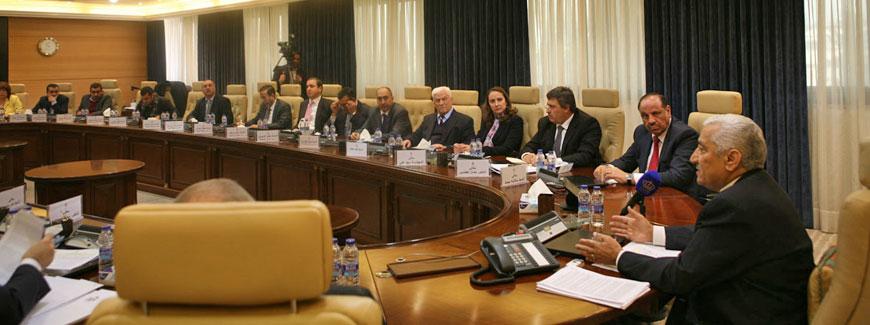You are here
Gov’t sends messages of assurance over integrating Syrians into labour force
By Omar Obeidat - Feb 11,2016 - Last updated at Feb 11,2016

Prime Minister Abdullah Ensour meets with journalists and chief editors of local dailies at the Prime Ministry on Wednesday (Petra photo)
AMMAN – The government on Wednesday said that allowing Syrians to join the labour market would not "by any means" affect job opportunities for Jordanians.
At a meeting with chief editors of daily newspapers and columnists to talk about the outcome of the Supporting Syria and the Region Conference, held in London last week, Prime Minister Abdullah Ensour said Syrian refugees in the Kingdom will not compete with Jordanians over job opportunities, adding that Syrians will be allowed to work in jobs usually shunned by Jordanians.
Ensour said Syrians can contribute to certain sectors in the labour market, such as agriculture and construction, as the majority of labourers in such fields are guest workers from various nationalities, indicating that the percentage of Jordanian workers in the agriculture sector, for example, stands only at 7 per cent.
On Sunday, the government announced that donor countries pledged during the London conference hundreds of millions of dollars to help Jordan cope with the Syrian refugee crisis in the form of grants and cheap loans, while the Kingdom pledged to integrate Syrians in the labour market.
Sending a message of assurances to the Jordanian public regarding Syrians’ access to the labour market, Ensour read out a paragraph of the “Jordan Compact”, the final statement issued by the Kingdom following the London donor conference. It outlined Jordan’s “holistic approach” to the refugee crisis and listed pledges made by donors to the Kingdom.
“Cumulatively, these measures could in the coming years provide 200,000 job opportunities for Syrian refugees while they remain in the country, contributing to the Jordanian economy without competing with Jordanians for jobs,” the document said.
The premier said this sentence was misunderstood by certain media outlets which assumed that the priority would be given to Syrian nationals.
“I want to assure all Jordanians. If a Jordanian applies for a job, it will be his or hers. But if Jordanians do not go for certain jobs, the priority will go to Syrians, among the guest workers,” he added.
Labour Minister Nidal Katamine explained that 18 “closed professions” will remain exclusive to Jordanians. He named engineering, medical, education, administrative and accounting jobs as examples.
Katamine reasserted that competition for jobs will be between Syrians and guest workers from various nationalities, adding that the government agreed with the private sector to integrate Syrians within the ratios of guest workers allocated for private businesses.
He said creating new jobs would be through new investments with priority given for Jordanians and then for Syrian workers.
Making Syrian labour in the Kingdom more efficient would be through attracting investments to five development zones: Irbid, Karak, Muwaqqar, Maan and Mafraq, he noted.
During the London conference, the government announced that donors pledged $700 million a year for 2016, 2017 and 2018 to develop services and infrastructure in the fields of health, education, water and municipal services in host communities.
Donors also pledged to offer concessionary loans worth $1.9 billion a year until 2018, in addition to grants worth $900 million over three years.
They also expressed willingness to secure funds for education to 80,000 to 90,000 Syrian students at a cost of $1 billion to build more classrooms and new schools to accommodate them.
Related Articles
AMMAN — The government is studying a decision to give Syrians, who work in the country without permits, a three-month period to rectify thei
AMMAN — Labour Minister Nidal Katamine on Wednesday met with Indonesian Ambassador to Jordan Teguh Wardoyo to discuss cooperation between th
AMMAN – The Cabinet on Sunday discussed eight measures in place to address unemployment as a top priority challenge, the Jordan News Agency,

















